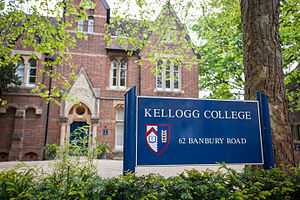Kellogg College
| Kellogg College | |
|---|---|

Blazon: Per pale indented argent and azure on the argent a chevron enhanced gules in base a book azure leaved argent on the azure an ear of wheat palewise or the whole within a bordure gules.
|
|
| University | University of Oxford |
| Location | Banbury Road and Bradmore Road |
| Coordinates | 51°45′50″N 1°15′36″W / 51.764°N 1.260°WCoordinates: 51°45′50″N 1°15′36″W / 51.764°N 1.260°W |
| Established | 1990 |
| Named for | Will Keith Kellogg |
| Sister college | None |
| President | Jonathan Michie |
| Postgraduates | 905 (total students, Dec 2015) |
| Website | www |
| Boat club | Christ Church Boat Club |
| Map | |
Kellogg College is a graduate-only constituent college of the University of Oxford in England. Founded in 1990 as Rewley House, Kellogg is the university's 36th college and the largest by number of students. It hosts research centres including the Institute of Population Ageing and the Centre for Creative Writing, and is closely identified with Lifelong learning at Oxford.
As with most of the university's graduate colleges, Kellogg College has an egalitarian spirit which is reflected by a lack of formal separation between fellows and students. The college has no high table and its grace is in Welsh which is unique among Oxford University's colleges.
The president of the college is Jonathan Michie who is Professor of Innovation & Knowledge Exchange and also holds the position of director of the Oxford University Department for Continuing Education. Michie succeeded the founder of the college, Geoffrey Thomas, as president.
Kellogg College was the first home for part-time students at the University of Oxford and many of the students who join the college continue to work in their professions while they study. The college continues to promote ideals of access, openness, and inclusivity. As of Michaelmas Term 2015[update] the student body numbers 905 students, of whom 231 are attending full-time and 674 part-time.
The college came into being on 1 March 1990 (as Rewley House) and was renamed in honour of Will Keith Kellogg on 1 October 1994, in recognition of the generous support given by the W. K. Kellogg Foundation to the university over the preceding decades. The college has close connections with the university's departments for continuing education, medicine, education, computer science, and law, and other departments active in areas of professional and part-time study. The Director of the Department for Continuing Education is ex officio President of Kellogg College.
The college can trace its origins back to the start of the university extension movement in the 1870s. In 1878, Arthur Johnson was the first to deliver an "Oxford Extension Lecture". The movement grew out of a drive to liberalise Oxford which gained momentum in the 1850s. As a consequence, the university slowly began to open itself to religious nonconformists, poorer men, and women. It is this movement that forms the historical background of Kellogg. The Oxford Extension movement is sometimes credited with taking "Oxford to the masses". Lectures were given in town halls, public libraries and village school rooms across the country. The aim of the extension movement was twofold: social and political. It aimed at educating the larger community to achieve a better informed democracy.
...
Wikipedia


